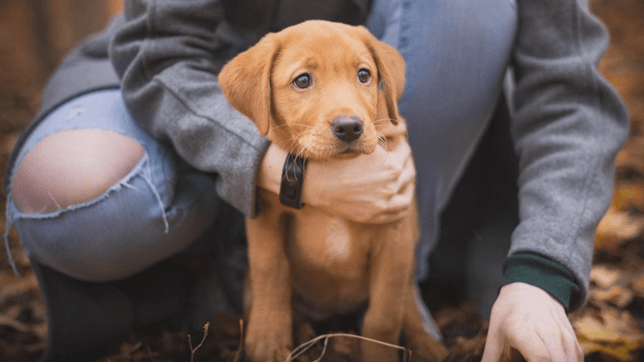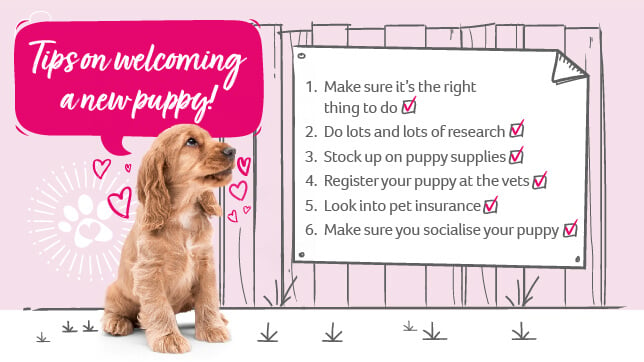11th February 2022
Top Tips on Welcoming a New Puppy into your Home

Planning to bring home a tiny puppy is an exciting time for everyone, from toddlers to grandparents. You’ll probably find yourself more popular than ever with people booking your time in advance, ready for when the new dog arrives. And rightly so, puppies are mega cute, but you don’t want to overwhelm them!
So, it’s important to prepare yourself and your home before you bring your new family member home. After all, you won’t have much time to think once it’s through the door.
Puppies are a lot like toddlers. You might need to buy a baby gate or two, make sure wires are out of the way, be prepared for awkward conversations at puppy school and you can’t take your eyes off them for a second. You just can’t.
Here is our guide to preparing your home for your (hairy) new addition.

Plan the details BEFORE the puppy arrives
Having a dog is brilliant. The walks at the beach, a pet-friendly picnic shared at the park, and someone to cuddle on the sofa at night. It’s almost perfect. But there are other points to consider, too…
- If you work, who will walk the dog during the day? Can you wake a few hours earlier?
- Does a local dog walker have space for your dog? Or a family member?
- Do you need to restrict access to parts of your house? How will you do this?
- What will your toilet arrangements be for your dog?
- How will you transport the dog if needed? (Highway Code requires restraining them)
These are just a few examples of the things you’ll need to consider, as well as agreeing on any house rules for your dog. Making sure these rules are set in stone before your puppy comes home will save on any confusion.
Pet insurance
At this point, you might want to look into pet insurance and assess the benefits and associated costs to see if it’s the right choice for you.
It’s a good idea to do some homework on what type of policy would best suit your puppy as well as what level of cover you’d want or need. Then you’ll be able to get quotes and see just how much it would cost to insure your puppy.
Some people often leave this too late and don’t realise how much policies vary between different dog breeds, so it’s best to look in advance. You will also want to look at the main benefits and exclusions a policy may have to make sure you would receive the cover you’re expecting or want.
Here at Animal Friends, we offer 4 different types of policies with 12 different levels of cover available. So, whether you would want Accident Only, Time Limited, Max Benefit or Lifetime cover for your puppy don’t forget to get a quote before you bring your dog home, but you won’t be able to set up a policy until you get your pup.
Get the right supplies and equipment
You’ll need to make sure you have all the right supplies for your pup so you’re able to spend quality time with your new friend without having too many emergency visits to the nearest pet shop.
You’ll need:
- Collar and lead
- Dog bed (consider the size of your dog when its fully grown, unless you’re happy to upgrade)
- Puppy food
- Bowls for food and water
- Toys, lots and lots of toys
- Puppy pads, lots of these, too!
- Dog carrier/harness for the car (legal requirement)
- Stair gates (if you wish to restrict access in the house)
Close all the exits
Make sure all entry and exit points are kept secure for the first few weeks, this includes windows and any cat flaps you might have already in your doors! Your puppy will need to be restricted to indoors at first, and only let outside under strict supervision.
Shut the cupboards and secure harmful substances
Keep cupboards and drawers securely shut and ensure harmful substances are kept locked away. Puppies are very inquisitive, and this could lead them into potentially dangerous situations with household chemicals, rodent poisons and other toxic substances.
Remove chewing and choking hazards
Watch out for loose change, small children’s toys, trailing wires and anything small lying around that could become a chewing or choking hazard – puppies like to use their mouths to explore, and chewing is an instinctive as it has many beneficial effects for dogs. Just not in all circumstances!
Reduce noise levels
Be aware of noise levels when bringing lots of people or young children into your home during the settling in period, as puppies senses are very acute and this could be overwhelming and potentially scary for them. It can be a good idea to have a designated space or room during this time which is off limits to kids and other pets.
Be careful of strong smells
Don’t spray aerosols or strong fragrances near their food or water bowls.
Be very mindful of small spaces
Puppies tend to be small and can get into some surprisingly small spaces! Unfortunately, this can expose them to danger if they find their way into a hazardous location (eg. washing machine), or get them into a traumatic situation where they get stuck and don’t have the experience to free themselves.
Assess the different places a puppy could explore and get into trouble, and if needs be take the appropriate action to block access to those locations.
Lots of attention
All puppies have loads of energy and require attention, but some breeds of dog require more than others, and it’s important for them to keep active and healthy. Play with your puppy daily and if you are at work during the day, have a shop around for interactive toys that will provide endless hours of fun until you return home.
Choose a vet & register your puppy
So now you’ve got your house set up with everything a puppy could ever need, it’s a good idea to speak to your local vets and get your puppy registered.
You can do this even if you haven’t agreed on a name and they’ll be able to talk you through any appointments your dog will need, from getting microchipped to receiving their first lot of vaccinations.
Puppy classes and socialisation
Be prepared to take part in some puppy classes, usually at veterinary practices or pet shops, as well as making sure your puppy is socialised early on. Just like toddlers, our puppies need to learn how to behave around people and other animals, something you need to help them with.
They will need to meet other adults, children, dogs, and other animals as well as experiencing a wide range of events, environments and situations. This way your puppy will grow up to be a happy, friendly and approachable dog.
Patience is a virtue
And finally, remember to be patient – it will take time for him/her to get used to his or her new surroundings. They may b
e timid/hide to start with, sometimes for up to a few weeks, but let them take it slowly and explore by themselves, and soon they will begin to develop their doggy personality!
Looking for more dog advice?
Find the information you need as we support you through every step of your journey with your canine companion.
Need puppy insurance?
Dog insurance can help cover the cost of veterinary treatment if your puppy gets injured or falls ill.
